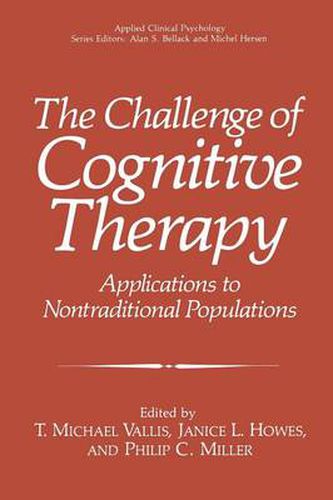Readings Newsletter
Become a Readings Member to make your shopping experience even easier.
Sign in or sign up for free!
You’re not far away from qualifying for FREE standard shipping within Australia
You’ve qualified for FREE standard shipping within Australia
The cart is loading…






This title is printed to order. This book may have been self-published. If so, we cannot guarantee the quality of the content. In the main most books will have gone through the editing process however some may not. We therefore suggest that you be aware of this before ordering this book. If in doubt check either the author or publisher’s details as we are unable to accept any returns unless they are faulty. Please contact us if you have any questions.
Cognitive therapy is fast becoming one of the more popular and well respected forms of psychotherapy. In both research and clinical practice, several advantages of cognitive therapy have been identified. Cognitive therapy is structured enough to provide a therapeutic framework for clinicians, as well as a theoretical framework for clinical researchers, yet flexible enough to address an individual’s problems in a highly idio syncratic manner. Accompanying the popularity of cognitive therapy is the expansion of its application beyond the areas in which it was initially developed and validated (the traditional areas of depression and anx iety) to areas where validation has not yet occurred (the nontraditional areas). We strongly believe that such broadening of cognitive therapy should be encouraged, but that conceptual models to guide the therapist and researcher in these areas should be explicated. It is the purpose of this text to provide a conceptual framework for dealing with select, nontraditional populations. The idea and motivation for this text develops from a cognitive therapy interest group in Toronto. All of the authors contributing to this text are involved in this group. We represent a group of cognitive thera pists functioning in a variety of diverse settings, including clinical re search units, general hospital settings, private or public rehabilitation centers, and private practices. Thus, the diversity of referrals for cogni tive therapy within our group is great.
$9.00 standard shipping within Australia
FREE standard shipping within Australia for orders over $100.00
Express & International shipping calculated at checkout
This title is printed to order. This book may have been self-published. If so, we cannot guarantee the quality of the content. In the main most books will have gone through the editing process however some may not. We therefore suggest that you be aware of this before ordering this book. If in doubt check either the author or publisher’s details as we are unable to accept any returns unless they are faulty. Please contact us if you have any questions.
Cognitive therapy is fast becoming one of the more popular and well respected forms of psychotherapy. In both research and clinical practice, several advantages of cognitive therapy have been identified. Cognitive therapy is structured enough to provide a therapeutic framework for clinicians, as well as a theoretical framework for clinical researchers, yet flexible enough to address an individual’s problems in a highly idio syncratic manner. Accompanying the popularity of cognitive therapy is the expansion of its application beyond the areas in which it was initially developed and validated (the traditional areas of depression and anx iety) to areas where validation has not yet occurred (the nontraditional areas). We strongly believe that such broadening of cognitive therapy should be encouraged, but that conceptual models to guide the therapist and researcher in these areas should be explicated. It is the purpose of this text to provide a conceptual framework for dealing with select, nontraditional populations. The idea and motivation for this text develops from a cognitive therapy interest group in Toronto. All of the authors contributing to this text are involved in this group. We represent a group of cognitive thera pists functioning in a variety of diverse settings, including clinical re search units, general hospital settings, private or public rehabilitation centers, and private practices. Thus, the diversity of referrals for cogni tive therapy within our group is great.